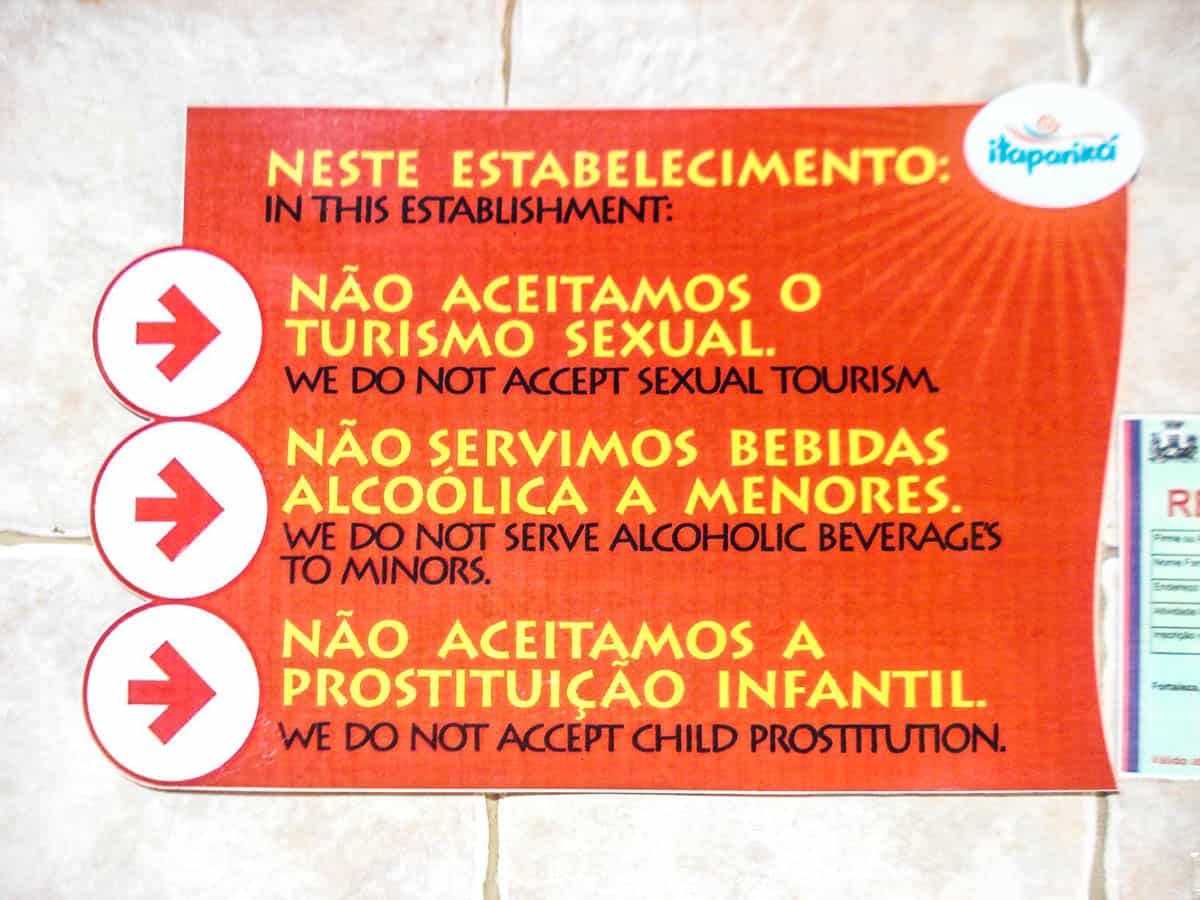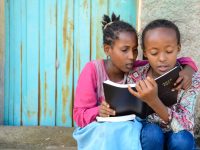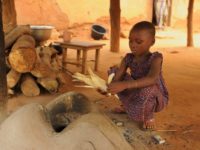Beautiful landscapes, exotic food and historical monuments are not the only attractions that draw foreigners to Brazil. The image of a country full of beautiful, sexy, young women has been used for decades to attract tourists to the country of Carnival, which contributes to the growing number of tourists coming to Brazil seeking sexual experiences in the arms of children and adolescents.
At sunset, when everyone has come back from lounging at the seaside, bars and restaurants turn their lights on and visitors leave their fancy hotels seeking nice dinners and fun with their families.
From the shadows, boys and girls appear on the corners, letting their skin show through their little clothes. With distorted values, they struggle for life. No one knows their life story or their dreams.
At Iracema Beach, male foreigners between the ages of 30 and 50, of middle or low class, crowd into nightclubs where children and adolescents anesthetized by cocaine and alcohol offer them sexual experiences for just a few dollars.
All of this begins with trips booked through specialized companies — mostly European — that provide special packages that include the tickets on exclusive flights and scheduled meetings with Brazilian boys and girls.
Once visitors arrive at the airport in Brazil, taxi drivers involved in the scheme of sexual recruitment of minors provide all necessary contacts.
Five of Brazil’s largest cities have high rates of commercial sexual exploitation of children and adolescents, almost all in the northeast region: Salvador, Natal, Recife, Fortaleza and Rio de Janeiro. The last three are home to Compassion partner churches.
Fortaleza is a tourist center located in northeastern Brazil. A land of beautiful beaches, the city has more than 2 million inhabitants and is marked by significant social inequalities. Around 720,000 people, or 36 percent of the population, live in the slums.
Fortaleza is also the fifth largest city in Brazil, with 336 square kilometers of totally urbanized areas. Among metropolitan areas it has the second largest percentage of people living in poverty.

The sea shore of Fortaleza is composed of Iracema, Meireles and Mucuripe beaches. Each of these beaches serves as a tourist attraction for both Brazilians and foreigners.
Within three kilometers are found the fanciest hotels and a mix of leisure, shopping and entertainment. This is also the main place where children and adolescents are offered to male tourists.
According to research conducted by the Brazilian Multidisciplinary Association for the Protection of Children and Adolescents (ABRAPIA), Fortaleza has the highest rate of commercial sexual exploitation of children and adolescents in the northeast region of Brazil. In the national ranking, it has the third highest number of complaints — after Rio de Janeiro and São Paulo.
The causes are numerous and complex, but poverty is one of the main factors. There are about 500,000 children, especially in the north and northeast regions, investing their lives in the hands of foreign pedophiles.
Young people fill the sidewalks, and are found in front of the dirty hotels, waiting for their next clients. Illiterate or of low education, these young people are unprepared for the labor market. In prostitution, they have found a mode of survival.
In the most dangerous slum in Fortaleza — Serviluz — are located two child development centers, Projeto Vilamar and Espaco Viva Vida Student Center.
The two centers in the area are working hard to tackle child prostitution in a preventive manner. The staff have been trained on and given material that will help them address the issues of children affected by prostitution. Weekly visits paid by Compassion staff to the children’s homes contribute to the identification of incidents of exploitation.
“The community is composed of approximately 35,000 inhabitants earning less than the Brazilian minimum wage of US $223 a month. The homes are less than 20 square meters in size where families of up to 10 people — between adults and children — live together.
“Without any conditions of privacy, there is often the occurrence of domestic violence or sexual abuse against the small ones. Frustrated and without any encouragement, all the children want is to be far from home. So they quit studying and become an easy target for the drug dealers. … In order to maintain their addiction, they simply go to the streets.
“The arts, dancing and theater workshops, the sports, the mentoring and the labor marketing the children learn at our center have been motivating boys and girls to dream about a better future where knowledge and hard work are the essential tools. The result is that today we see our adolescents finishing high school, far from the streets and changing the course of their lives.”
— Joyce, the director of Projeto Vilamar for 25 years
“The families are emotionally unstructured and the community grows in a disorganized way. The habitation is precarious; there is uncertainty in the community due to the war between gangs over drug power; there is a lack of basic sanitation. Many children eat only while they are here … some of them, with the consent of their families, offer their bodies in exchange for some rice.
“The first step is to assist the child more closely, advise and warn the family about the harm they are causing. Teachers, psychologists and the church are involved in the process. If there are no changes, then we access the government authorities.”
— Josilene, director of Espaco Viva Vida Student Center
Across the coastline is another dangerous slum of Fortaleza — the Pirambu. It is in the community of Pirambu that Carmem has been directing Centro Estudantil Bom Samaritano for five years, with more than 900 children sponsored through Compassion.
“Many mothers here are prostitutes and they are a strong example for their children, who grow up believing that prostitution is the fastest way to earn money. But today, after working inside the community, these mothers hope for a different future for their babies. And they count on us in order to achieve it.”
Jane is one of these mothers. At age 22, she has been working in the nightclubs of Iracema Beach for almost eight years. Illiterate, Jane left school when she got pregnant by her first boyfriend; she was 12 years old and the boy, a delinquent youth addicted to crack, was 16. A baby boy with curious eyes was born.
At the age of 16, Jane quit fighting against her “husband’s” addiction to drugs. Advised by some experienced friends, Jane left her husband and started dancing at a strip club. Her son is now registered with Compassion.
“It was an aunt of mine who enrolled my little boy at the child center; he attends the same church as her. And I like it because he can play with other children and have good meals … sometimes we have nothing to eat at home.”
Because of the Compassion centers, children like Jane’s son have the opportunities they need to lead a lifestyle different than that of their parents.







15 Comments |Add a comment
First off, I thank God for everyone of you, as it is very clear that you have a profound love for not only your sponsored child, but every child in Brazil. I’m blessed to call you my brothers and sisters in Christ. My heart breaks to see what is happening in Brazil. All the deaths, and with so much poverty. I spoke to Compassion International last week to find out that the Child Development Center in Fortaleza has been temporarily closed due to Covid-19. My sponsored child’s name is Ana. Please pray for her as I have not heard from her in almost 6 months. Unfortunately, Compassion has no information for me either. We serve an awesome God who loves us with a love we can’t begin to fathom. How comforting to know he is always at work protecting us, guiding us etc. Blessings upon all of you, and please stay safe.
I can understand their situation and I’m proud of that that is orginization doing its best to stop child prostitution. I already knew about this situation when I was a kid. But now I know where I’ll be heading to adopt a kid. Especially in Brazil and Thailand
Thank you for posting this information. I just sponsored my first child as of Jan 21, 2011. Her name is Iris and she is 14, she lives just north of Recife. I had no idea that this was so prevalent in Brazil let alone in the area where Iris lives. I will pray for her protection all the more in light of this information. Thank you.
My tiny boy is in Fortaleza and I sit and cry as I read these things. The enemy is truly great. My God is GREATER. I pray again.
I did not know that child prostitution was also in Brazil. I can’t believe that its happening there as well. It is just very disturbing that people that old are doing those things to kids.It just very sad that this is happening to children so young and that they are in this position.
This is a sad story, Poverty forces many people to make horrible choices.
Thankyou for posting this research on this site. This information and these statistics demonstrate a widespread problem in these impoverished areas that for the most part the global community is silent on. I now sponsor five boys and five girls in fortaleza and recife. I used to sponsor 2 boys and 2 girls from these areas until I visited Brazil last year in 2009. Now that I hsve seen how effective and impscting these projects are, I am challenged to invest more in these life changing, life saving projects that offer these children hope in Jesus. God bless you all and thanyou for your posts, vey encouraging. Lets all take a stand in whatever way we can to stop this injustice…In Jesus name. Amen
Thank you for posting this. I sponsor an 11-year-old girl in Fortaleza, and I have become increasingly concerned about her safety over the last few weeks, as I have learned more about these issues. It is important to raise awareness of child exploitation so that more of us sponsors will be motivated to do something about it, and so we know better how to pray for our children.
Just this week, I have written a letter to my child in Fortaleza, to let her know that these kinds of problems are important to me, and give her strategies for protecting herself from predators. May God give us all wisdom in writing to our children!
I had no idea about prostitution being so widespread in Recife and Fortaleza. My current child is from west of Fortaleza and my former child is from Recife. Thank you for opening my eyes to this horrific issue. Sadly, I thought that the northwest coast was ‘safer’ (and much smaller in size) than Rio de Janeiro as here in the US the only news that gets here tends to be of bad things in Rio de Janeiro. I’d thought if I visited Fortaleza on my own that I would be in a small area practically in the middle of nowhere. I now understand that it wouldn’t be hard to get to Fortaleza as it is a tourist center! Perhaps I should have done more research on the area before…
This article really hit me because all 5 of my children live in Fortaleza and Recife. One of them even attends the featured project, Vilamar and lives in Serviluz. I pray for him and my other 4 children to be protected and learn their value and worth to God; I want them to internalize the value that God has on their life and not become the prey of things that will have them feeling worthless and only brings destruction.
If I had a child I can’t imagine letting my child sell his body to make money for the family. It seems that when one is desperate and at his/her end, one does things to survive that he/she wouldn’t do in better times. One really needs the Lord and a strong mind to survive all of the mess that life brings.
Sometimes I try to imagine what the world would be like if everyone knew how much God valued them and they internalized this in their mind and heart.
My prayers feel tiny compared to the size of the situation, but God isn’t, so I’ll keep praying!
Now I know where the next child that I will be sponsering will be from!
I don’t even know what to say…. It confounds me that any parent would actually put their child in that position.
Hard not to feel overwhelmed by the situation…. 🙁
This is so sad. I just can imagine people doing this to children. I’m also thankful for Compassion’s ministry in these situations.
It is sickening to think of children selling their bodies just to survive, which is Reason 567 873 (I don’t know, I’ve lost count) why I’m so thankful for Compassion and the work they do to stop stuff like this from happening.